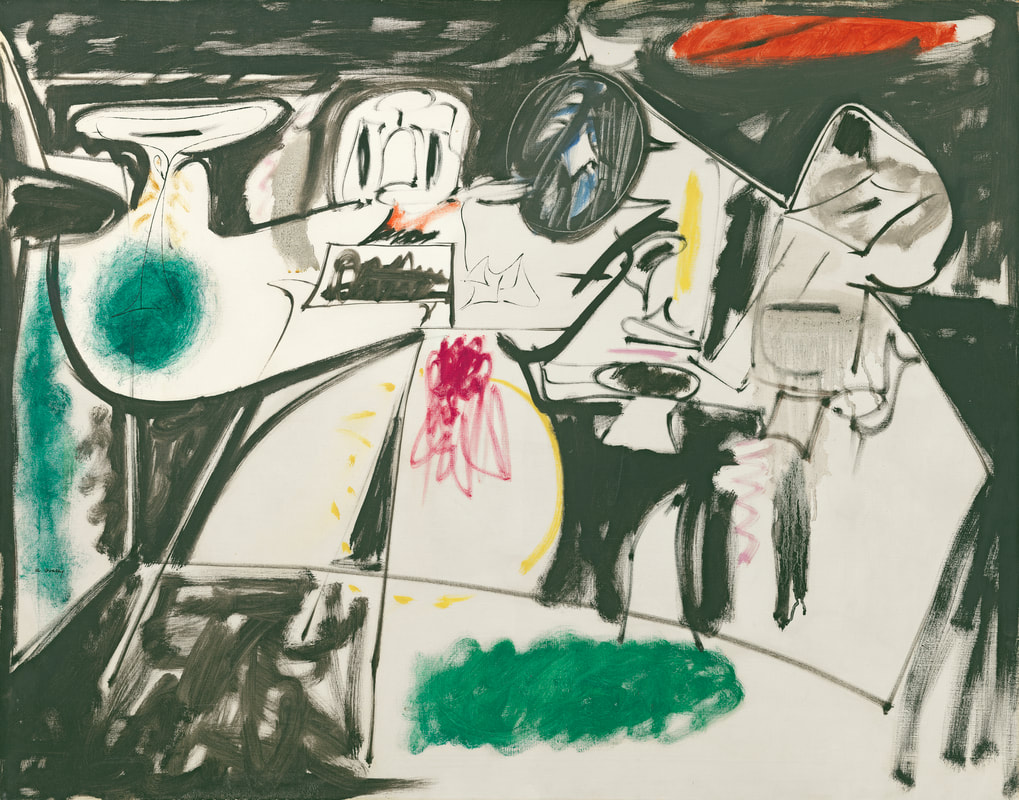Aida Zilelian: Arshile
 Last Painting (The Black Monk), by Arshile Gorky (USA, b.Vilayet of Van, Armenia, Ottoman Empire) 1948. Oil on canvas. 78.6 x 101.5 cm, Museo Nacional Thyssen-Bornemisza, Madrid, Inv. no. 564 (1978.72)
Last Painting (The Black Monk), by Arshile Gorky (USA, b.Vilayet of Van, Armenia, Ottoman Empire) 1948. Oil on canvas. 78.6 x 101.5 cm, Museo Nacional Thyssen-Bornemisza, Madrid, Inv. no. 564 (1978.72)Arshile jan[1],
if we had been friends
I would have smoked cigarettes with you
until my throat was raw and made you listen
to Billie Holiday (did you know “Strange Fruit”?) while
nursing vodka (I would have hated but conceded to) just for you.
I read you loved vodka.
Arshile,
you could have rung my apartment bell
at any hour of the night
and I would have let you in, cradled your face in my hands,
consumed by your wild, vacant eyes
and said nothing.
Love could not transcend the
shadow of ghosts that claimed you long before you escaped,
fled the shores of Lake Van,
your mother’s bosom cold from death –
a body that could no longer soak up your child tears.
This is not why I love you.
Arshile,
I would never have been so star-struck
that your death could have surprised me,
but I would never have forgiven myself
for not deciphering the suicide note
in the slants of your abstractions
and unsettling hues of teal, magenta,
annihilated by frenzied strokes of black.[2]
They incriminate you but,
I would not have seen.
All I know is that your face,
your dark moustache, the grace of your troubled eyes and swept back hair
leave me to think that I could not have saved you, and
loved you nonetheless.
Aida Zilelian
[1] An abbreviation of the Armenian word ‘janig’ (a term of endearment – i.e. darling, love
[2] Arshile Gorky’s last painting, Last Painting (The Black Monk) 1948
Aida Zilelian is a first generation American-Armenian writer and educator from Queens, NY. Her fiction explores the depths of love and family relationships, culture and the connections between characters that transcend time and circumstance. Her first novel (unpublished) The Hollowing Moon, was one of the top three finalists of the Anderbo Novel Contest. The sequel The Legacy of Lost Things was published in 2015 (Bleeding Heart Publications) and was the recipient of the 2014 Tölölyan Literary Award. Aida has been featured on NPR, The Huffington Post, Kirkus Reviews, Poets & Writers, the New York Times, and various reading series throughout Queens and Manhattan. Her short story collection These Hills Were Meant for You was shortlisted for the 2018 Katherine Anne Porter Award.
Originally published in The Ekphrasic Review

